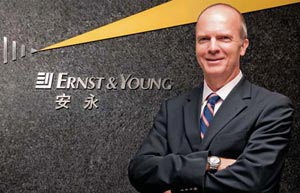
Dearth of talent
|
 |
|
Nigel Knight, managing partner of Ernst & Young, Greater China. [Photo/China Daily] |
The demand for well-trained Chinese consultants versed in global business practices has also created a massive gap in the talent pool for consulting firms in China.
"The biggest issue facing management consulting firms is the lack of consultants, as requirements for a consultant are very strict," says Zhou Tianle, chair of the Management Consulting Committee of China Enterprises Confederation, a non-profit organization
"It does not only require the consultants to have specific knowledge in this field, but also possess ample work experience."
With a fairly short history - consulting in China has only been around since the 1980s, and only became an established industry in the mid 1990s - finding qualified Chinese consultants with a good grasp of Western business practices is nearly impossible.
But as the industry grows, so will also the number of Chinese graduates returning from overseas studies to begin their careers at home. But until that effectively happens, the industry and the talent will be reliant on each other in China.
While the promise of engaging in the most efficient business practices is alluring, hiring a premium consultant is by no mean a cheap task.
With fees ranging anywhere from 1 million yuan ($158,000, 129,000 euros) to 10 million yuan per case, hiring a top-end firm is a deep pocketed investment for any company. Though the relative immaturity of the industry in China has allowed big firms to record healthy growth rates, it is becoming increasingly competitive.
During the early 2000s when China's potential as an economic juggernaut was first being realized, there were roughly 100 firms offering management consulting services. But as the interest in doing business in China flourished over the past decade, so have also the number of companies offering consulting services, with 28,100 management consulting firms now operating in the Middle Kingdom, according to the IBIS World report.
"It's an intensely dynamic and competitive market," Knight says.
While most of these are medium-sized or boutique firms, unable to cope with the workload of giving a company a complete management overhaul, they offer their services for a fraction of the price. But the difference in price also reflects a difference in services.
While medium and boutique firms can satisfy the basic requirements of small businesses, larger staff and a bigger global network allow premium firms to offer a much wider skill-set than most of the newer players.
"It's quite hard to be successful in China if you've just got a very simple generic set of offerings. Our client expectations have increased immeasurably in recent years - both multinational and local - and you've really got to have something different and something interesting to say to be successful," Knight says.
Though competition for domestic clients between high-end Chinese firms and international firms is fierce, premium firms like Ernst and Young have managed to maintain their advantage in the international arena.
But with multinational companies reeling from issues like the debt crisis in Europe and the slow recovery of the US economy, thereby hampering growth opportunities, China remains a bustling route for expansion.


 Washington to remain focused on Asia-Pacific
Washington to remain focused on Asia-Pacific RQFII target blue chips amid bear market
RQFII target blue chips amid bear market Australian recall for top two exporters
Australian recall for top two exporters China fears new car restrictions
China fears new car restrictions